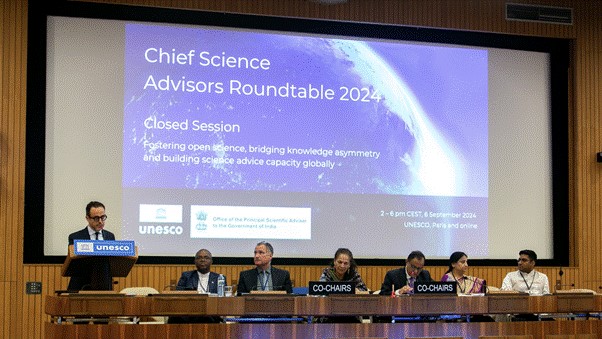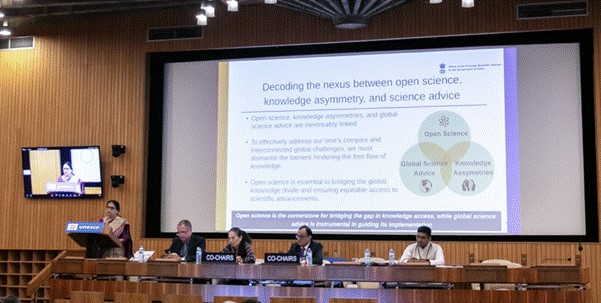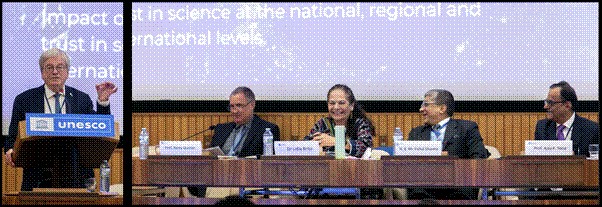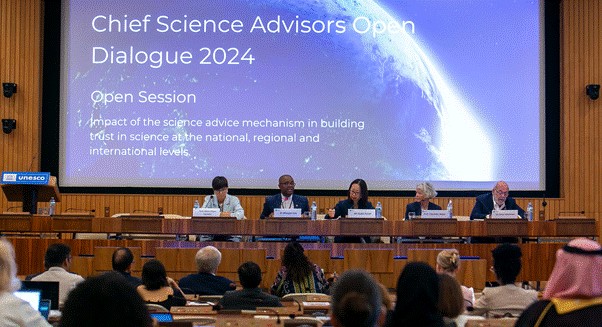2024 Edition of the Chief Science Advisers Roundtable (CSAR) took place, on 6 September 2024, at the headquarters of United Nations Educational, Scientific and Cultural Organization (UNESCO) in Paris, France. This roundtable was co-organized by the Office of the Principal Scientific Adviser to the Government of India and the Natural Sciences Sector of UNESCO. The CSAR was conceptualised and launched as a Sherpa-track initiative during India’s G20 Presidency in 2023.

CSAR 2024 brought together delegations of chief science advisers and their nominated equivalents from 29 countries and 8 international organisations to discuss the theme “Fostering open science, bridging knowledge asymmetry, and building science advice capacity globally.” The roundtable was co-chaired by the Principal Scientific Adviser to the Government of India Professor Ajay Kumar Sood, and Assistant Director-General of the Natural Sciences Sector at UNESCO Dr. Lidia Brito.
In her welcome remarks, Dr. Brito emphasised the importance of this partnership between UNESCO and the Government of India in making CSAR a global initiative with an expanded scope, also as an initiative positioned in the International Decade of Sciences for Sustainable Development (2024-33). Prof. Sood, in his opening remarks, highlighted the significance of bridging the gap between science and policy, building science advice capacity globally. Scientific Secretary, Office of the Principal Scientific Adviser to the Government of India, Dr. Parvinder Maini made a theme-setting presentation where she spoke about decoding the nexus of open science, knowledge asymmetry and science advice. Dr. Maini also provided an update on the progress of CSAR-2023 agenda items and called on the delegations to join hands in the ongoing efforts.

Through their interventions, the delegations spoke about the importance of the theme and presented their approach towards achieving this collective cause. The discussion reiterated the growing importance of science and technology in tackling complex global challenges that are deeply interconnected and extend beyond both sectoral and geographic boundaries. The discussion emphasised the potential impact and dual nature of disruptive technologies on knowledge creation and dissemination, as well as in decision-making processes and advocated for building robust science advice systems at the national, regional and global levels. Dr Mlungisi Cele, Head, National Advisory Council on Innovation (NACI), South Africa, expressed their commitment to CSAR and informed the delegations that South Africa will be hosting the next Chief Science Advisers’ Roundtable in 2025. Senior Advisor to the Director-General and UNESCO’s G20 Sherpa, Dr. Charaf Ahmimed concluded the session with his message of embedding science in multilateral systems and processes.
Participating countries included Australia, Botswana, Brazil, Canada, Denmark, Egypt, the European Union, France, Germany, Indonesia, Ireland, Italy, Japan, Kenya, Latvia, the Netherlands, New Zealand, Norway, Panama, Portugal, the Republic of Cyprus, Russia, Saudi Arabia, Senegal, South Africa, Spain, Tunisia, the United Kingdom, and the United States. Contributions were also made by international organisations such as the International Network for Governmental Science Advice (INGSA), the International Science Council (ISC), the Organisation for Economic Co-operation and Development (OECD), UNESCO-The World Academy of Sciences (TWAS) Board, United Nations Environment Programme (UNEP), UN Secretary General’s Scientific Advisory Board, UNESCO, and the World Health Organization (WHO).

The roundtable was preceded by an open dialogue session focusing on the impact of science advice mechanisms in building trust in science at national, regional, and global levels. Professor Remi Quirion, Chair of the International Network for Government Science Advice (INGSA) and Chief Scientist of Québec, delivered a keynote wherein he highlighted the importance of scientific literacy, science diplomacy, open access to scholarly scientific knowledge and the critical role of national science advice mechanisms in fostering trust in science.

This was followed by an enriching panel discussion, where Prof. Maria Chiara Carrozza, President of the Italian National Research Council and Chair “Research 7” (G7 Engagement Group), Dr Mlungisi Cele, Head, National Advisory Council on Innovation (NACI), South Africa, Sir Peter Gluckman, President, International Science Council and Prof. Charlotte Watts, Chief Science Adviser, FCDO, United Kingdom, shared insights on the theme of the open dialogue. Ms Ayaka Suzuki, Director, Strategic Planning and Monitoring Unit Executive Office of the Secretary-General; UN SG-Scientific Advisory Board, moderated the panel.
 Matribhumi Samachar English
Matribhumi Samachar English


